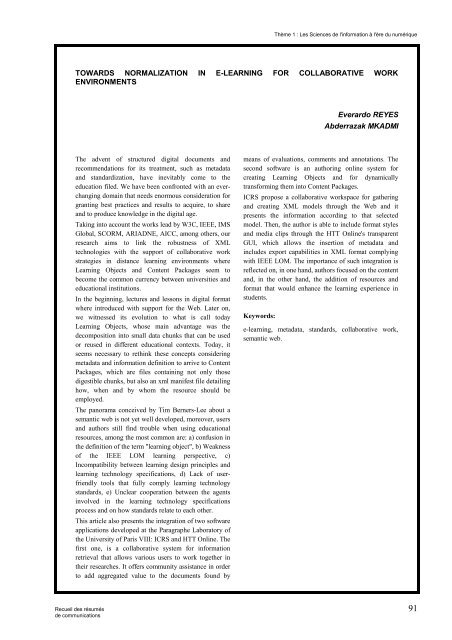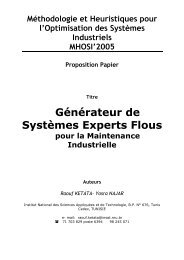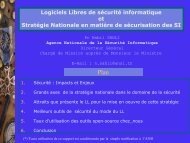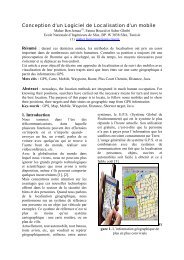l'information numérique et les enjeux de la ... - smsi :: tunis 2005
l'information numérique et les enjeux de la ... - smsi :: tunis 2005
l'information numérique et les enjeux de la ... - smsi :: tunis 2005
You also want an ePaper? Increase the reach of your titles
YUMPU automatically turns print PDFs into web optimized ePapers that Google loves.
Recueil <strong>de</strong>s résumés<br />
<strong>de</strong> communications<br />
Thème 1 : Les Sciences <strong>de</strong> <strong>l'information</strong> à l'ère du <strong>numérique</strong><br />
TOWARDS NORMALIZATION IN E-LEARNING FOR COLLABORATIVE WORK<br />
ENVIRONMENTS<br />
The advent of structured digital documents and<br />
recommendations for its treatment, such as m<strong>et</strong>adata<br />
and standardization, have inevitably come to the<br />
education filed. We have been confronted with an everchanging<br />
domain that needs enormous consi<strong>de</strong>ration for<br />
granting best practices and results to acquire, to share<br />
and to produce knowledge in the digital age.<br />
Taking into account the works lead by W3C, IEEE, IMS<br />
Global, SCORM, ARIADNE, AICC, among others, our<br />
research aims to link the robustness of XML<br />
technologies with the support of col<strong>la</strong>borative work<br />
strategies in distance learning environments where<br />
Learning Objects and Content Packages seem to<br />
become the common currency b<strong>et</strong>ween universities and<br />
educational institutions.<br />
In the beginning, lectures and <strong>les</strong>sons in digital format<br />
where introduced with support for the Web. Later on,<br />
we witnessed its evolution to what is call today<br />
Learning Objects, whose main advantage was the<br />
<strong>de</strong>composition into small data chunks that can be used<br />
or reused in different educational contexts. Today, it<br />
seems necessary to r<strong>et</strong>hink these concepts consi<strong>de</strong>ring<br />
m<strong>et</strong>adata and information <strong>de</strong>finition to arrive to Content<br />
Packages, which are fi<strong>les</strong> containing not only those<br />
digestible chunks, but also an xml manifest file d<strong>et</strong>ailing<br />
how, when and by whom the resource should be<br />
employed.<br />
The panorama conceived by Tim Berners-Lee about a<br />
semantic web is not y<strong>et</strong> well <strong>de</strong>veloped, moreover, users<br />
and authors still find trouble when using educational<br />
resources, among the most common are: a) confusion in<br />
the <strong>de</strong>finition of the term "learning object", b) Weakness<br />
of the IEEE LOM learning perspective, c)<br />
Incompatibility b<strong>et</strong>ween learning <strong>de</strong>sign princip<strong>les</strong> and<br />
learning technology specifications, d) Lack of userfriendly<br />
tools that fully comply learning technology<br />
standards, e) Unclear cooperation b<strong>et</strong>ween the agents<br />
involved in the learning technology specifications<br />
process and on how standards re<strong>la</strong>te to each other.<br />
This article also presents the integration of two software<br />
applications <strong>de</strong>veloped at the Paragraphe Laboratory of<br />
the University of Paris VIII: ICRS and HTT Online. The<br />
first one, is a col<strong>la</strong>borative system for information<br />
r<strong>et</strong>rieval that allows various users to work tog<strong>et</strong>her in<br />
their researches. It offers community assistance in or<strong>de</strong>r<br />
to add aggregated value to the documents found by<br />
Everardo REYES<br />
Ab<strong>de</strong>rrazak MKADMI<br />
means of evaluations, comments and annotations. The<br />
second software is an authoring online system for<br />
creating Learning Objects and for dynamically<br />
transforming them into Content Packages.<br />
ICRS propose a col<strong>la</strong>borative workspace for gathering<br />
and creating XML mo<strong>de</strong>ls through the Web and it<br />
presents the information according to that selected<br />
mo<strong>de</strong>l. Then, the author is able to inclu<strong>de</strong> format sty<strong>les</strong><br />
and media clips through the HTT Online's transparent<br />
GUI, which allows the insertion of m<strong>et</strong>adata and<br />
inclu<strong>de</strong>s export capabilities in XML format complying<br />
with IEEE LOM. The importance of such integration is<br />
reflected on, in one hand, authors focused on the content<br />
and, in the other hand, the addition of resources and<br />
format that would enhance the learning experience in<br />
stu<strong>de</strong>nts.<br />
Keywords:<br />
e-learning, m<strong>et</strong>adata, standards, col<strong>la</strong>borative work,<br />
semantic web.<br />
91





